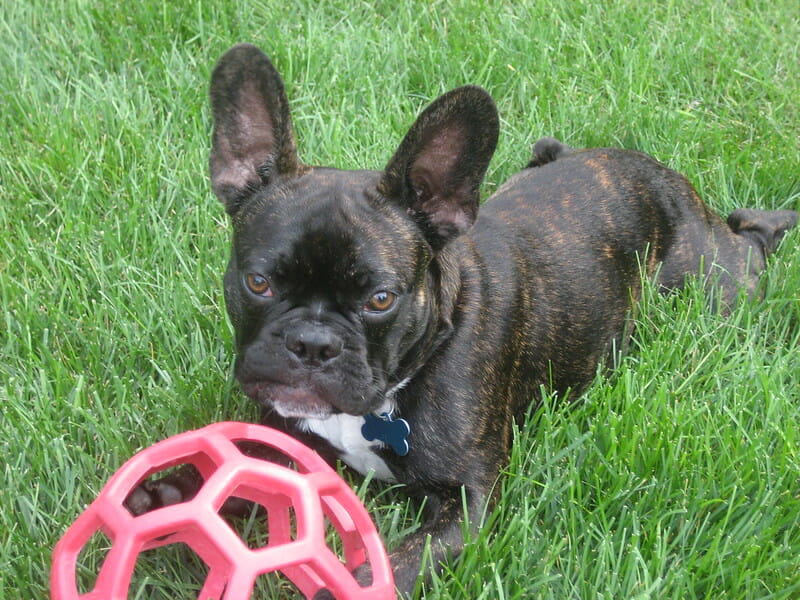What is a Frenchton? The Delightful Charm and Playfulness


Have you ever come across a dog breed that seems to embody the best of two worlds?
Meet the Frenchton, an enchanting mix that combines the elegance of a French Bulldog and the spirited nature of a Boston Terrier.
This captivating hybrid breed has been winning hearts with its unique blend of characteristics and undeniable charm.
In this article, we’ll delve into the history, physical traits, health considerations, training tips, and more about the lovable Frenchton.
History of the Frenchton Breed
The captivating story of the Frenchton breed starts with a visionary quest to create a canine companion that beautifully combines the best qualities of both parent breeds.
It was a deliberate endeavor to merge the French Bulldog’s distinctively dapper appearance with the Boston Terrier’s infectious exuberance.
Through careful breeding and selection, a delightful result emerged—a small-sized dog that inherits the captivating charm, intelligence, and playfulness of both breeds.
Originating in the United States, the Frenchton has gained immense popularity among dog lovers for its mesmerizing looks, endearing personality, and remarkable adaptability to various lifestyles.
With their expressive eyes, adorable wrinkles, and loving disposition, Frenchtons have stolen the hearts of many and continue to bring joy and companionship to countless households around the world.

Physical Characteristics of Frenchtons
With their expressive faces and unique coat colors, Frenchtons are a sight to behold.
Their sturdy yet compact build, inherited from the French Bulldog side, gives them an adorable and confident posture.
Their distinctive markings and sleek coat, reminiscent of the Boston Terrier, make them stand out from the crowd.
But what truly adds an extra touch of whimsy to their appearance are their ears.
Often a mix of the two parent breeds’ styles, their ears can be pointy or slightly rounded, making each Frenchton’s look truly one-of-a-kind.
Frenchtons come in an array of coat colors, ranging from brindle and pied to fawn and black.
Their coat patterns are like artwork, with unique combinations and variations that make each Frenchton a little masterpiece.
And let’s not forget their soulful eyes.
Those big, expressive eyes can melt anyone’s heart and make them utterly irresistible.
When a Frenchton looks at you with those eyes, it’s impossible not to fall in love.
So, whether it’s their charming faces, their eye-catching coat colors, or their captivating eyes, Frenchtons truly are a breed that captivates the hearts of many.
Health and Grooming for Frenchtons
Like any breed, the health of your Frenchton is of paramount importance. Due to their mixed heritage,
Health issues
Frenchtons are generally a healthy breed, but they may inherit some of the health conditions that can affect their parent breeds. This includes:
- Brachycephalic airway syndrome (BAS) which can cause difficulty breathing and overheating
- Luxating patellas or slipped stifles, both causing lameness in your pup’s hind legs
- Skin allergies
- Cherry eye (inflammation of the third eyelid)
- Spinal problems
It’s always a good idea to be aware of any health risks associated with your dog’s breed so that you can take steps to minimize the likelihood of health issues in your pup.
You should also ensure that you get regular check-ups for your Frenchton from a veterinarian and keep them on a schedule of preventative care.
Grooming
Frenchtons require fairly minimal grooming, with a weekly brushing to keep their coat shiny and healthy.
They are an average shedder that may need more frequent brushing during the shedding season.
Keep in mind that Frenchtons love to play outdoors so they will likely need occasional baths to get rid of dirt and debris from their coats.
Making sure your furry friend’s nails are kept neat and their ears are well-maintained is crucial to prevent possible health problems like ear infections.
These grooming responsibilities can be managed easily within your home or with assistance from a trained groomer.

Training and Care for Frenchtons
Frenchtons, a crossbreed known for their intelligence and strong desire to please, are an absolute delight to train.
With their quick wit and eagerness to learn, they excel in obedience and agility.
However, alongside their remarkable traits, Frenchtons can sometimes showcase a touch of stubbornness, requiring a patient and positive approach during training sessions.
Socialization plays a pivotal role in shaping Frenchtons into well-rounded companions.
Introducing them to various environments, people, and other animals from a young age helps them develop excellent social skills and become adaptable in any situation.
To truly keep them engaged and prevent boredom, regular mental stimulation and physical activity are essential for Frenchtons.
Their energetic nature thrives on challenges and interaction, so incorporating puzzle toys, obedience games, and interactive playtime into their routine can keep their minds sharp and their bodies active.
Whether it’s learning new tricks or simply enjoying their company, Frenchtons are sure to bring endless joy and companionship to those lucky enough to have them in their lives.
Pros and Cons of Owning a Frenchton
Owning a Frenchton is an incredibly rewarding experience.
With their captivating looks and delightful personality, these pups have quickly become one of the most popular dogs in recent years.
And while they bring immense joy and love to their owners, there are some aspects to consider before bringing home a Frenchton.
Pros
- Affectionate and loyal companions
- Low-maintenance grooming needs
- Easy to train and intelligent
- Adaptable to various environments
- Compact size, making them suitable for apartments or small living spaces
Cons
- Susceptible to some health issues associated with their parent breeds
- Some Frenchtons may develop separation anxiety when left alone for long periods of time
- Can be prone to overeating and obesity if not monitored closely
- Prone to snoring due to their short muzzles
- Can become quite noisy with their unique ‘voice’
At the end of the day, Frenchtons are an amazing breed that brings joy and companionship into countless households.
For those looking for a gentle, affectionate pup to join their family, a Frenchton is the perfect choice.

Conclusion
Frenchtons are a captivating blend of elegance and playfulness, born from the crossbreeding of French Bulldogs and Boston Terriers.
With their expressive eyes, wrinkled forehead, and compact yet muscular build, they turn heads wherever they go.
But it’s not just their looks that make them special.
Frenchtons have a friendly and affectionate nature, forming strong bonds with their human companions.
Their spirited and playful demeanor makes them perfect for individuals or families with an active lifestyle.
Owning a Frenchton is embarking on a delightful journey filled with companionship and joy.
FAQs
Yes, Frenchtons are known for their affectionate and gentle nature, making them great companions for families with children.
Frenchtons have moderate exercise needs. Daily walks and interactive playtime are usually sufficient to keep them happy and healthy.
Yes, with proper socialization, Frenchtons can get along well with other pets, including dogs and cats.
While they are generally healthier than their purebred counterparts, Frenchtons may still be prone to respiratory and joint issues due to their mixed heritage.
On average, Frenchtons have a lifespan of around 10 to 12 years, though, with proper care, some can live longer.



